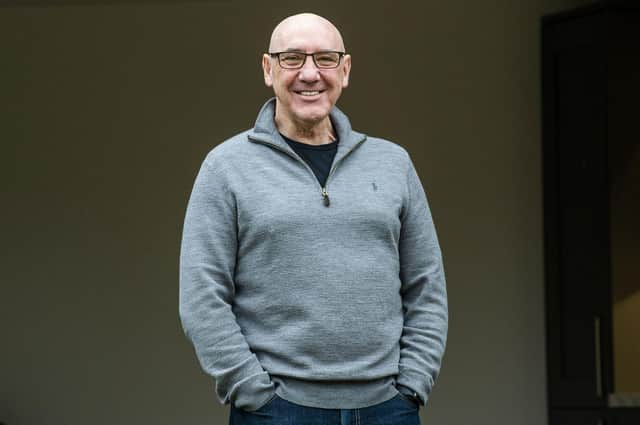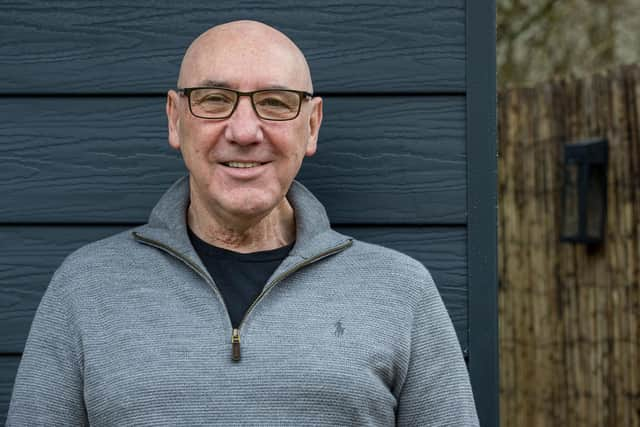How facing cancer helped me turn my company into a major player: Commsworld's Ricky Nicol discusses his most pivotal moment in business


But 15 years ago I went to the doctor about a lump on my neck. I didn’t think it was anything serious, but it turned out to be throat cancer.
When I was growing up cancer was seen as a death sentence, although the odds are much better now for people diagnosed with the disease.
Advertisement
Hide AdAdvertisement
Hide AdI asked the consultant if I was going to die and he said that I wouldn’t make it past six months without any treatment. Even with treatment, there was only a 50:50 chance of survival.


However, he explained that due to factors such as my relatively young age – 44 – it meant I could get the maximum treatment, which was really intense and too much for older, more frail patients.
I had radiotherapy, chemotherapy and a neck dissection. I was off work for more than a year, lost three stone, and for the first five or six months or so, I really wasn't well. At one stage I didn't think I'd ever get back to work, to be honest.
But then as I started to recover, although I wasn't well enough to return to work, I spent a lot of time on the internet as there was nothing else to do, and I saw how it let you research so much.
I became convinced that it was going to grow arms and legs, so in a strange way my illness was a good thing – it gave me the vision that Commsworld should become more internet-driven rather than core telephony driven as we had been.
I said to my wife “look, this may fail, and once I start going down this road, the company could collapse – or I could just leave it as is, ticking along, or I could just bail out”.
In fact, a close friend suggested that I sell my stake in the business and have an “easy life” – by then I was already financially comfortable anyway.
But perversely, I was more determined, because I thought, “no, I've got a second chance, I'll just go for it – and if it doesn't work, it doesn't work. I don't care. Because I thought I'd rather try and fail than sit back and think I wonder what could have happened”.
Advertisement
Hide AdAdvertisement
Hide AdBefore my illness, I was risk-averse and played it safe, but after I thought I would give more things a go – and if I fail, I’m not going to die, I’ll just be back where I was before.
It literally gave me the drive to change the direction of Commsworld – it was a major changing point. It took a while before we kicked into the big time because of things like the financial crash, but it was a defining moment in my career and my life.
When I got back to work, my colleagues made sure that I wasn’t working 12 hours a day any more, so in a strange way I was probably less stressed than before, but I was more determined. As my dad used to say, life’s not a rehearsal.
But whenever I spoke to competitors of any significance, any scale, any size, they all repeatedly said I couldn’t grow Commsworld to be a major player. Some would literally laugh at us and say we could never compete.
I used to just say “fine, that’s for me to find out”. Then, once we started winning contracts and delivering them, the customers put in writing that we were a better, slicker, faster, sharper and nicer service than any other carrier they’d used – and some of the big firms that had doubted us ended up folding.
We've won FTSE 100 customers and four of the biggest councils in Scotland – and last year we completed the final stage of our UK-wide optical core network.
If you go back a few years, it would have been impossible for a firm of our scale to win the deals that we’ve done across the UK and deliver them – and to build a network using our own sweat, guts and intelligence.
We’ve delivered what no other Scottish company’s ever done – we’ve built a major network across the UK with no external money, which rivals the Vodafones and BTs. We manage the largest privately-funded optical core network in the country – and now we’re going head to head with these incumbents and winning major contracts.
Advertisement
Hide AdAdvertisement
Hide AdLast year we were named one of the UK’s "most dynamic and fastest-growing” small and medium sized enterprises by London Stock Exchange Group. Additionally I won the lifetime achievement prize at the WeDo Scottish Business Awards, and that’s on the back of a lot of encouragement from key Scottish entrepreneurs like Brian Williamson, Paul Atkinson, Jim McColl and Chris van der Kuyl.
It’s also actually been easier than I thought it would be to bid for big contracts, which we ended up winning. When you face your fear, it’s not as frightening as you thought it would be and I think that goes for cancer or business – although you have no choice with cancer; in business you can just walk away.
Commsworld has grown from five people – it's a big company now. We've got big ambitions to grow and grow and grow, and I still want to be part of that.
However, with everything I’ve been through, particularly my cancer, I want to be able to take some time out as well. I’ve stepped down as CEO, and am now vice-chairman, remaining on the board. I have a great senior team, so I’m more than comfortable with doing that.
I'm genuinely as excited about the future as I am proud about the past.
As told to Emma Newlands
A message from the Editor:
Thank you for reading this article. We're more reliant on your support than ever as the shift in consumer habits brought about by coronavirus impacts our advertisers.
If you haven't already, please consider supporting our trusted, fact-checked journalism by taking out a digital subscription.
Comments
Want to join the conversation? Please or to comment on this article.
